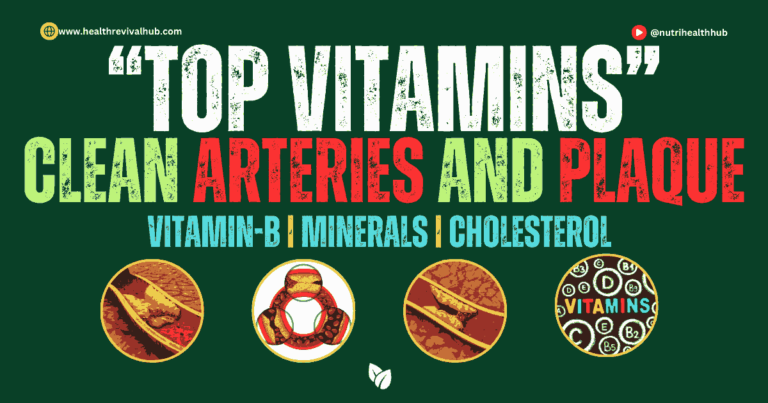Why Focus on Removing Calcium Plaque From Arteries?
Heart health is a growing concern worldwide. Many people suffer from calcium plaque buildup in arteries. This condition restricts blood flow and increases heart disease risk. Therefore, understanding how to remove calcium plaque from arteries is vital. Nutrients play a key role in this process. They support cardiovascular health naturally. Moreover, they reduce dependency on medications.
Calcium plaque in arteries often goes unnoticed. However, it leads to serious complications. For instance, it causes high blood pressure. It also increases the risk of heart attacks. Focusing on nutrients that remove calcium plaque from arteries can reverse this damage. These nutrients promote arterial flexibility and reduce stiffness. As a result, your heart functions better. For more insights, refer to this study on vitamin D’s role in calcium regulation.
How Do Nutrients Help Remove Calcium Plaque From Arteries?
Nutrients work by breaking down calcium deposits in arteries. They also prevent further plaque formation. Antioxidants play a key role in this process. For example, vitamin K2 activates proteins that regulate calcium. Similarly, magnesium helps maintain arterial flexibility. These nutrients effectively remove calcium plaque from arteries. As a result, blood circulation improves significantly. Learn more about vitamin K2’s role in arterial health here.
Moreover, some nutrients reduce inflammation. Chronic inflammation contributes to plaque buildup. Omega-3 fatty acids are excellent anti-inflammatory agents. They protect arteries from damage. Additionally, antioxidants neutralize free radicals. Free radicals harm arterial walls. Thus, nutrients not only remove calcium plaque from arteries but also prevent future issues. Explore the anti-inflammatory effects of omega-3 fatty acids in this research paper.
Vitamin K2: A Key Nutrient to Remove Calcium Plaque From Arteries
Vitamin K2 is essential for heart health. It activates matrix GLA proteins. These proteins prevent calcium from depositing in arteries. Studies show that vitamin K2 reduces arterial stiffness. Foods like cheese and natto are rich in this nutrient. Including them in your diet can help remove calcium plaque from arteries. Thus, vitamin K2 is a must-have nutrient. For detailed evidence, check out this scientific review on vitamin K2.
Additionally, vitamin K2 works alongside vitamin D. Together, they regulate calcium levels. Vitamin D ensures proper absorption. Vitamin K2 directs calcium to bones. This prevents arterial calcification. Therefore, both nutrients are crucial. They remove calcium plaque from arteries efficiently. Always aim for a balanced intake of these vitamins. Read more about their synergy here.
Magnesium: A Mineral That Helps Remove Calcium Plaque From Arteries
Magnesium supports muscle and nerve function. It also maintains healthy blood vessels. Low magnesium levels lead to arterial calcification. This mineral works alongside vitamin K2. Together, they remove calcium plaque from arteries. Foods like spinach, almonds, and avocados are magnesium-rich. Adding these to your meals boosts heart health. For scientific backing, refer to this study on magnesium and cardiovascular health.
Furthermore, magnesium reduces blood pressure. High blood pressure damages arteries. It also accelerates plaque formation. Magnesium counters this effect. It relaxes arterial walls. As a result, blood flows smoothly. Thus, magnesium is vital to remove calcium plaque from arteries. Ensure you consume enough of this mineral daily.
Omega-3 Fatty Acids: Anti-Inflammatory Agents.
Omega-3 fatty acids fight inflammation in arteries. Chronic inflammation leads to plaque buildup. Fish oil and flaxseeds are rich sources of omega-3. Regular intake reduces arterial damage. Additionally, it lowers bad cholesterol levels. Thus, omega-3 fatty acids help remove calcium plaque from arteries. They are vital for heart health. For deeper insights, explore this research on omega-3 and inflammation.
Moreover, omega-3 improves blood lipid profiles. It increases good cholesterol levels. Good cholesterol removes excess cholesterol from arteries. This prevents plaque accumulation. Furthermore, omega-3 reduces triglycerides. High triglycerides harm heart health. Therefore, omega-3 fatty acids are essential. They remove calcium plaque from arteries effectively.
Vitamin D: Regulating Calcium.
Vitamin D ensures proper calcium absorption. Without it, calcium deposits in arteries. Sunlight exposure boosts vitamin D levels. Foods like salmon and fortified milk also help. Adequate vitamin D prevents arterial calcification. Hence, it removes calcium plaque from arteries. Maintaining optimal levels is essential for heart health. For more details, refer to this study on vitamin D’s role in calcium metabolism.
Additionally, vitamin D supports immune function. A strong immune system protects arteries. It fights infections that harm blood vessels. Moreover, vitamin D reduces inflammation. Inflammation accelerates plaque formation. Thus, vitamin D plays a dual role. It removes calcium plaque from arteries and strengthens immunity. Always monitor your vitamin D levels.
Coenzyme Q10: Energy for Cells.
Coenzyme Q10 boosts energy production in cells. Heart cells require high energy levels. CoQ10 ensures they function optimally. It also acts as an antioxidant. This protects arteries from oxidative stress. Oxidative stress damages arterial walls. Thus, CoQ10 helps remove calcium plaque from arteries. For scientific validation, see this study on resveratrol’s antioxidant effects, which complements CoQ10’s role.
Moreover, CoQ10 improves blood pressure. High blood pressure harms arteries. It also accelerates plaque buildup. CoQ10 counters this effect. It relaxes arterial walls. As a result, blood flows smoothly. Therefore, CoQ10 is essential. It removes calcium plaque from arteries effectively. Include CoQ10-rich foods like meat and nuts in your diet.
Vitamin C: Protecting Arteries.
Vitamin C is a powerful antioxidant. It neutralizes free radicals. Free radicals damage arterial walls. This accelerates plaque formation. Vitamin C prevents this damage. It strengthens arterial walls. Thus, it removes calcium plaque from arteries. Citrus fruits and bell peppers are rich in vitamin C. For more information, refer to this study on antioxidants and arterial health.
Additionally, vitamin C supports collagen production. Collagen maintains arterial elasticity. Elastic arteries reduce blood pressure. This prevents plaque buildup. Moreover, vitamin C improves immune function. A strong immune system protects arteries. Therefore, vitamin C is crucial. It removes calcium plaque from arteries naturally.
Polyphenols: Natural Protectors.
Polyphenols are plant compounds with antioxidant properties. They protect arteries from damage. Green tea and dark chocolate are rich in polyphenols. Regular consumption reduces inflammation. Inflammation accelerates plaque formation. Thus, polyphenols help remove calcium plaque from arteries. For scientific evidence, read this paper on resveratrol and polyphenols.
Moreover, polyphenols improve blood flow. They relax arterial walls. This reduces blood pressure. High blood pressure harms arteries. Polyphenols counter this effect. Additionally, they lower bad cholesterol levels. Bad cholesterol contributes to plaque buildup. Therefore, polyphenols are essential. They remove calcium plaque from arteries effectively.
Fiber: Reducing Cholesterol.
Fiber reduces cholesterol levels in the blood. High cholesterol leads to plaque buildup. Soluble fiber binds to cholesterol. It removes it from the body. Oats, beans, and fruits are rich in fiber. Including them in your diet helps remove calcium plaque from arteries. For more details, refer to this study on dietary fiber and heart health.
Additionally, fiber improves digestion. Proper digestion supports overall health. It also regulates blood sugar levels. High blood sugar damages arteries. Fiber counters this effect. Moreover, it promotes weight loss. Excess weight strains the heart. Thus, fiber is crucial. It removes calcium plaque from arteries naturally.
Other Essential Nutrients to Remove Calcium Plaque From Arteries
Besides the mentioned nutrients, others are equally important. Selenium, zinc, potassium, and resveratrol play vital roles in heart health. Each of these nutrients has unique properties that contribute to removing calcium plaque from arteries.
Selenium: An Antioxidant Powerhouse
Selenium is a trace mineral with potent antioxidant properties. It protects arteries by neutralizing free radicals. Free radicals cause oxidative stress, which damages arterial walls. This damage accelerates plaque formation. Selenium combats this process. It works alongside other antioxidants like vitamin C and E. Together, they remove calcium plaque from arteries effectively. Brazil nuts, seafood, and whole grains are rich in selenium. For scientific references, see this study on antioxidants.
Zinc: Supporting Immune Function and Enzyme Activity
Zinc is essential for immune function and enzyme activity. A strong immune system protects arteries from infections. Infections can harm blood vessels and accelerate plaque buildup. Zinc also supports enzyme systems that repair arterial walls. This prevents further damage. Foods like oysters, pumpkin seeds, and lentils are zinc-rich. Including them in your diet helps remove calcium plaque from arteries. Learn more here.
Potassium: Regulating Blood Pressure
Potassium plays a critical role in regulating blood pressure. High blood pressure damages arteries and accelerates plaque formation. Potassium counters this effect by relaxing arterial walls. It also balances sodium levels in the body. Sodium imbalance increases blood pressure. Bananas, sweet potatoes, and spinach are excellent sources of potassium. Consuming these foods helps remove calcium plaque from arteries naturally. Refer to this study on potassium and blood pressure.
Resveratrol: A Powerful Polyphenol
Resveratrol is a polyphenol found in red wine, grapes, and berries. It has strong antioxidant and anti-inflammatory properties. Resveratrol protects arteries from oxidative stress and inflammation. Both conditions contribute to plaque buildup. Additionally, resveratrol improves blood flow. It relaxes arterial walls, reducing blood pressure. This makes it easier to remove calcium plaque from arteries. Incorporating resveratrol-rich foods into your diet is beneficial. For detailed insights, read this research paper on resveratrol.
Moreover, these nutrients work synergistically. For example, selenium and zinc boost antioxidant activity. Potassium and magnesium regulate blood pressure together. Resveratrol enhances the effects of other polyphenols. Thus, a balanced intake of all these nutrients is essential. They remove calcium plaque from arteries effectively. Always focus on a diverse, nutrient-rich diet.
Conclusion:
In conclusion, nutrients play a vital role in heart health. A diet rich in these nutrients prevents cardiovascular diseases. Start including them today for long-term benefits. Remember, prevention is better than cure. Focus on nutrients that remove calcium plaque from arteries for a healthier life.
Moreover, lifestyle changes support nutrient intake. Regular exercise improves circulation. Stress management reduces inflammation. Both enhance nutrient effectiveness. Thus, adopt a holistic approach. Combine nutrients with healthy habits. This removes calcium plaque from arteries efficiently. Your heart will thank you for it. For further reading, explore these scientific studies on heart health.
Frequently Asked Questions
Plaque buildup in arteries can be dissolved by certain nutrients and lifestyle changes. Key nutrients include vitamin K2, magnesium, and omega-3 fatty acids. Vitamin K2 activates proteins that prevent calcium deposits. Magnesium relaxes arterial walls and reduces stiffness.
Omega-3 fatty acids fight inflammation, which contributes to plaque formation. These nutrients work together to dissolve plaque naturally. For more details, refer to this study on nutrient effects.
To stop calcium plaque in arteries, focus on nutrients that regulate calcium and reduce inflammation. Vitamin K2 directs calcium to bones instead of arteries. Vitamin D ensures proper calcium absorption. Antioxidants like vitamin C and polyphenols protect arteries from damage. Additionally, a diet rich in fiber lowers cholesterol levels, preventing plaque accumulation. Combining these nutrients with regular exercise stops calcium plaque effectively.
Vitamins play a crucial role in dissolving plaque in arteries. Vit- K2 activates matrix GLA proteins that remove calcium deposits. Vitamin C strengthens arterial walls and neutralizes free radicals. Vitamin D regulates calcium levels, preventing arterial calcification. Coenzyme Q10 acts as an antioxidant, protecting arteries from oxidative stress. Including these vitamins in your diet helps dissolve plaque naturally. Learn more about their roles here.
The best foods to remove plaque from arteries are nutrient-rich and heart-healthy. Leafy greens like spinach and kale are high in vitamin K2. Fatty fish like salmon provide omega-3 fatty acids. Nuts and seeds are excellent sources of magnesium and healthy fats. Avocados and olive oil reduce bad cholesterol levels. Whole grains and oats are rich in fiber, which binds to cholesterol and removes it from the body. Incorporating these foods into your diet supports arterial health. For scientific insights, check out this research on heart-healthy foods.

